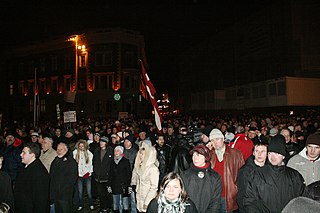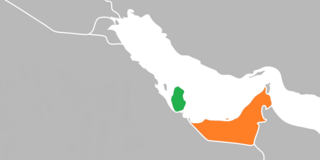| |||||
| Decades: | |||||
|---|---|---|---|---|---|
| See also: | |||||
Events in the year 2012 in Cyprus .
| |||||
| Decades: | |||||
|---|---|---|---|---|---|
| See also: | |||||
Events in the year 2012 in Cyprus .
Ongoing – 2012–2013 Cypriot financial crisis; Cyprus dispute

The economy of Cyprus is a high-income economy as classified by the World Bank, and was included by the International Monetary Fund in its list of advanced economies in 2001. Cyprus adopted the euro as its official currency on 1 January 2008, replacing the Cypriot pound at an irrevocable fixed exchange rate of CYP 0.585274 per €1.

The euro area, commonly called the eurozone (EZ), is a currency union of 20 member states of the European Union (EU) that have adopted the euro (€) as their primary currency and sole legal tender, and have thus fully implemented EMU policies.
Eurobonds or stability bonds were proposed government bonds to be issued in euros jointly by the European Union's 19 eurozone states. The idea was first raised by the Barroso European Commission in 2011 during the 2009–2012 European sovereign debt crisis. Eurobonds would be debt investments whereby an investor loans a certain amount of money, for a certain amount of time, with a certain interest rate, to the eurozone bloc altogether, which then forwards the money to individual governments. The proposal was floated again in 2020 as a potential response to the impacts of the COVID-19 pandemic in Europe, leading such debt issue to be dubbed "corona bonds".

The 2008–2014 Spanish financial crisis, also known as the Great Recession in Spain or the Great Spanish Depression, began in 2008 during the world 2007–2008 financial crisis. In 2012, it made Spain a late participant in the European sovereign debt crisis when the country was unable to bail out its financial sector and had to apply for a €100 billion rescue package provided by the European Stability Mechanism (ESM).

The 2008 Latvian financial crisis, which stemmed from the 2007–2008 financial crisis, was a major economic and political crisis in Latvia. The crisis was generated when an easy credit market burst, resulting in an unemployment crisis, along with the bankruptcy of many companies. Since 2010, economic activity has recovered and Latvia's economic growth rate was the fastest among the EU member states in the first three quarters of 2012.

The European debt crisis, often also referred to as the eurozone crisis or the European sovereign debt crisis, was a multi-year debt crisis that took place in the European Union (EU) from 2009 until the mid to late 2010s. Several eurozone member states were unable to repay or refinance their government debt or to bail out over-indebted banks under their national supervision without the assistance of third parties like other eurozone countries, the European Central Bank (ECB), or the International Monetary Fund (IMF).

The European Financial Stability Facility (EFSF) is a special purpose vehicle financed by members of the eurozone to address the European sovereign-debt crisis. It was agreed by the Council of the European Union on 9 May 2010, with the objective of preserving financial stability in Europe by providing financial assistance to eurozone states in economic difficulty. The Facility's headquarters are in Luxembourg City, as are those of the European Stability Mechanism. Treasury management services and administrative support are provided to the Facility by the European Investment Bank through a service level contract. Since the establishment of the European Stability Mechanism, the activities of the EFSF are carried out by the ESM.

From late 2009, fears of a sovereign debt crisis in some European states developed, with the situation becoming particularly tense in early 2010. Greece was most acutely affected, but fellow Eurozone members Cyprus, Ireland, Italy, Portugal, and Spain were also significantly affected. In the EU, especially in countries where sovereign debt has increased sharply due to bank bailouts, a crisis of confidence has emerged with the widening of bond yield spreads and risk insurance on credit default swaps between these countries and other EU members, most importantly Germany.

Qatar and the United Arab Emirates share a naval border and are part of the Arabic-speaking Persian Gulf region. They are both members of the GCC.

The European Stability Mechanism (ESM) is an intergovernmental organization located in Luxembourg City, which operates under public international law for all eurozone member states having ratified a special ESM intergovernmental treaty. It was established on 27 September 2012 as a permanent firewall for the eurozone, to safeguard and provide instant access to financial assistance programmes for member states of the eurozone in financial difficulty, with a maximum lending capacity of €500 billion. It has replaced two earlier temporary EU funding programmes: the European Financial Stability Facility (EFSF) and the European Financial Stabilisation Mechanism (EFSM).
Lamia al Hariri is Syria's former chargée d'affaires in the Republic of Cyprus who defected to Qatar in July 2012.

European debt crisis contagion refers to the possible spread of the ongoing European sovereign-debt crisis to other Eurozone countries. This could make it difficult or impossible for more countries to repay or re-finance their government debt without the assistance of third parties. By 2012 the debt crisis forced 5 out of 17 Eurozone countries to seek help from other nations. Some believed that negative effects could spread further possibly forcing one or more countries into default.

The 2012–2013 Cypriot financial crisis was an economic crisis in the Republic of Cyprus that involved the exposure of Cypriot banks to overleveraged local property companies, the Greek government-debt crisis, the downgrading of the Cypriot government's bond credit rating to junk status by international credit rating agencies, the consequential inability to refund its state expenses from the international markets and the reluctance of the government to restructure the troubled Cypriot financial sector.

The eurozone crisis is an ongoing financial crisis that has made it difficult or impossible for some countries in the euro area to repay or re-finance their government debt without the assistance of third parties.

The eurozone crisis is an ongoing financial crisis that has made it difficult or impossible for some countries in the euro area to repay or re-finance their government debt without the assistance of third parties.
The Qatar diplomatic crisis was a high-profile incident involving the deterioration of ties between Qatar and the Arab League between 2017 and 2021. It began when Saudi Arabia, the United Arab Emirates, Bahrain, and Egypt simultaneously severed their bilateral relations with Qatar and subsequently banned Qatar-registered aircraft and Qatari ships from utilizing their sovereign territory by air, land, and sea; this involved the Saudis' closure of Qatar's only land crossing, initiating a de facto blockade of the country. Tensions between the two sides came to a close in January 2021, following a resolution between the Saudis and the Qataris.
Events in the year 2020 in Cyprus
Events in the year 2013 in Cyprus.
In 2009–2010, due to substantial public and private sector debt, and "the intimate sovereign-bank linkages" the eurozone crisis impacted periphery countries. This resulted in significant financial sector instability in Europe; banks' solvency risks grew, which had direct implications for their funding liquidity. The European central bank (ECB), as the monetary union's central bank, responded to the sovereign debt crisis with a series of conventional and unconventional measures, including a decrease in the key policy interest rate, and three-year long-term refinancing operation (LTRO) liquidity injections in December 2011 and February 2012, and the announcement of the outright monetary transactions (OMT) program in the summer of 2012. The ECB acted as a de facto lender-of-last-resort (LOLR) to the euro area banking system, providing banks with cash flow in exchange for collateral, as well as a buyer of last resort (BOLR), purchasing eurozone sovereign bonds. However, the ECB's policies have been criticised for their economic repercussions as well as its political agenda.